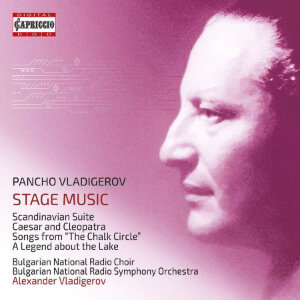
Pancho Vladigerov (1899-1978)
Stage Music
Scandinavian Suite Op.13
Two Orchestral Pieces from Caesar & Cleopatra
Three Songs from Twelfth Night Op.26
Four Songs from The Chalk Circle Op.19
Happiness Op.50
Two Suites from A Legend about the Lake Op.40
Rumjana Valcheva Evrova (soprano); Pavel Gerdjikov (bass)
Bulgarian National Radio Choir (in Happiness)
Bulgarian National Radio Symphony Orchestra/Alexander Vladigerov
rec. 1970-75, Balkanton, Sofia, Bulgaria
Capriccio C8067 [2 CDs: 163]
This extremely well-filled 2-CD set has already been given a most enthusiastic and lengthy review by Rob Barnett, and in general I concur with his comments. However, I have to say that I found the recording quality to be somewhat below par. In common with many recordings issued by the Eastern European Communist States in the 1970’s and 80’s, these discs reveal a sometimes-glaring close-up sound, which despite the recent digital remastering in Vienna, remains to eventually tire the listener. The same can be said of the one earlier release in the series that I possess, reviewed by Jonathan Woolf.
This sounds like I am trashing a unique set of recordings, but it should go almost without saying that I welcome this and other cd’s in the cycle, because without it, so much of his enjoyable music would not be available.
The first item is his Scandinavian Suite, which he based on his incidental music to August Strindberg’s Ett Drömspel (A Dream Play). In revising the earlier work in order to create the suite (1925), Vladigerov employed his not inconsiderable gifts as an orchestrator to move from a pit-sized ensemble to full orchestra. Influences abound, not surprisingly since he worked in Berlin from 1920, so we should not be surprised to find that Richard Strauss looms large. The entire work is splendid; memorable and impactive, ranging from delicate woodwind and harp to blazing brass (Strauss’ Alpine symphony?). The booklet states that it is the composer’s most popular work in Bulgaria, and I can easily hear why.
Next up are Three Songs from Twelfth Night, dating from 1931. He composed them for an open-air performance in Salzburg, which unfortunately was rained off. Their style is a melodically easy Slavic romance, and they are sung splendidly by soprano Rumjana Valcheva Evrova and bass Pavel Gerdjikov, both of whom display noticeable Slavic timbres. They are placed very forward in the recorded balance, although the orchestra is not compromised to any degree.
The third item is an orchestra suite from the music he composed for a play entitled Happiness by Orlin Vassilev, and was his final work of this kind. By this time – 1954 – the Communists were in control of Bulgaria, and in collaborating with Vassilev he worked for the first and only time with an artist who was directly affiliated with the regime. There is a slight shift in his compositional style, when the music displays a Bulgarian Nationalist tinge, most noticeably in the 4th movement Red Poppy, where a splendidly sonorous choir sing a song describing how the seed of a red poppy shall produce many scarlet blossoms. I suppose that this might be a reference to communism blossoming in Bulgaria. It is followed by a purely orchestral Dramatic Episode, wherein Vladigerov’s melodic style becomes much less easy on the ear. Only in the last movement Hymn to Happiness do we encounter the sort of patriotic, militaristic exhortation that can often be associated with Soviet Music.
Next we have an early work from 1925, his Four Songs from The Chalk Circle, a play by Alfred Henschke, in which he translated a 13th century Chinese work. Here the composer displays the easy melodic style we heard in his Scandinavian Suite, and although the booklet refers to “exotic Asian type elements” incorporated by Vladigerov, you would be hard pushed to notice them, I think.
Perhaps the most atmospheric piece on the first CD in this set is the Desert Nocturne from the play Caesar and Cleopatra by Bernard Shaw. Vladigerov was just 21 at the time he composed it, and it is the sort of impressionistic piece that many composers produced in the late 19th and early 20th century. It is very nice indeed, spoiled by the absurdly close-up balance given to a violin solo. It is continued as the first item on CD 2.
Apart from the short continuation mentioned above, the whole of CD 2 is filled with two orchestral suites from the ballet A Legend about the Lake which date from 1946. They play for 72 minutes and the music resembles Khachaturian and Respighi in full orchestral dress, although the very opening, emerging as it does from the deepest recesses of the orchestra, immediately reminded me of the first minutes if Ravel’s Left-Hand Concerto. I think that these suites are the most vividly attractive of all the works in this set with so fine a display of orchestral colour and memorable material that I immediately searched online to see if either CPO or Naxos had recorded them. Alas, neither has done so, and I will have to make do with these recordings and their vivid but typically Soviet sound. Having criticised them sonically, I must say that the performances, conducted by the composer’s son, are strongly committed and the orchestral playing is very fine. It is a pity that the full ballet had to wait until 1962 for a performance, and being in the Soviet Union one is immediately suspicious that the delay was due to political interference, but there is nothing in the ballet story that could have upset even the most rabid communist. When Vladigerov produced the suites, they immediately found acceptance.
In summary, these are two desirable CDs that seem to have been remastered as well as possible to modernise the sound. The performances are excellent and the production by Capriccio is very good indeed, with a detailed booklet in German and English, including the words of the songs in both languages.
Jim Westhead
Help us financially by purchasing from



Previous review: Rob Barnett (July 2023)


















